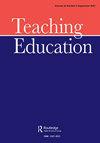用Q方法论探讨职前教师的公民教育信念
IF 1.1
Q2 EDUCATION & EDUCATIONAL RESEARCH
引用次数: 0
摘要
摘要本研究采用Q法对基础教育入门课程中大学生公民教育思想进行了探讨。该研究要求学生们将之前开发的衡量意识形态的调查项目整理成一个金字塔,从同意到不同意。分析发现学生中有四种类型,分别是批判性多元文化主义者、民族主义者、不满者和制度主义者。在一节课上,参与者完成了q分类,并研究了他们的信念如何影响他们的教学实践和课堂讨论。学生们还完成了对q-sort的反思,他们表示,这项活动使他们对自己的信仰有了更深入的了解,同时也启发了同学们思想上的多样性。该研究还证明了Q方法论的实用性,它不仅是一种研究方法,还可以提供一种强大的教学工具,将研究成果转化为实践。本文章由计算机程序翻译,如有差异,请以英文原文为准。
Exploring preservice teachers’ civic education beliefs with Q methodology
ABSTRACT This study explored college students’ civic education ideologies in an entry-level elementary education course using Q methodology. The study asked the students to sort previously developed survey items measuring ideology onto a pyramid ranging from agree to disagree. The analysis found four patterns among students, which were labeled critical multiculturalist, nationalist, disaffected, and institutionalist. A lesson was developed where participants completed the q-sort and studied how their beliefs could influence their instructional practices and classroom discussions. The students also completed reflections on the q-sort, where they expressed that the activity developed a more in-depth understanding of their own beliefs while also illuminating their classmates’ ideological diversity. The study also demonstrates Q methodology’s utility, beyond being a research method, which can provide a powerful instructional tool to translate research into practice.
求助全文
通过发布文献求助,成功后即可免费获取论文全文。
去求助
来源期刊

Teaching Education
EDUCATION & EDUCATIONAL RESEARCH-
CiteScore
3.80
自引率
6.20%
发文量
15
期刊介绍:
Teaching Education is an interdisciplinary forum for innovative practices and research in teacher education. Submission of manuscripts from educational researchers, teacher educators and practicing teachers is encouraged. Contributions are invited which address social and cultural, practical and theoretical aspects of teacher education in university-, college-, and school-based contexts. The journal’s focus is on the challenges and possibilities of rapid social and cultural change for teacher education and, more broadly, for the transformation of education. These challenges include: the impact of new cultures and globalisation on curriculum and pedagogy; new collaborations and partnerships between universities, schools and other social service agencies; the consequences of new community and family configurations for teachers’ work; generational and cultural change in schools and teacher education institutions; new technologies and education; and the impact of higher education policy and funding on teacher education. Manuscripts addressing critical and theory-based research or scholarly reflections and debate on contemporary issues related to teacher education, will be considered. Papers should attempt to present research, innovative theoretical and/or practical insights in relevant current literature and debate.
 求助内容:
求助内容: 应助结果提醒方式:
应助结果提醒方式:


